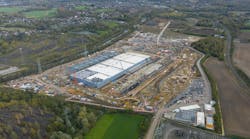New Skills, Training Are Essential for the Data Center Workforce
The adoption of new technologies leads to competitive advantages, which then benefits customers, users, and data center leaders. Change also creates both challenges and opportunities for the data center workforce.
I had the pleasure of helping co-author the recent AFCOM State of the Data Center Industry report, where we found some fascinating trends. Much of the report focused on trends in cloud, IoT, edge solutions, and power density. But the report also dug into the trends impacting the personnel who help a data center operate.
Nearly one in three respondents (30%) to the AFCOM survey said they were experiencing difficulty in recruiting Data Center Facility Technicians, Engineers and Operators. From there, 21% indicated difficulties finding good staff to help with cloud architecture, and 19% said that both DevOps staff and IT security personnel are in demand, but hard to find.
Organizations Are Investing More in Personnel and Training
The top three drivers of this increased investment include increased demand for on-site coverage, increased training and certification requirements, and retention costs for existing staff.
Furthermore, the report found that respondents are more likely to anticipate increased investment in training data center personnel (60%) than in hiring data center personnel (42%). Similarly, the top three drivers of this anticipated investment increases include increased training and certification requirements, retention costs for existing staff, and increased demand for on-site coverage.
On the training front, you can expect to see emerging technologies play a very important role for data center leaders. In fact, respondents feel their teams can benefit from training opportunities in operations and process management, as well as cloud, followed by facilities management and data and/or network security. Here’s a look at where respondents see the most value in staff training:
An important point here is that data center leaders are actively hiring good people who can help them grow and evolve. The report shows that edge and remote locations are growing and will require more people to help those parts of the business bring in value. When it comes to personnel investments and need, a third of respondents anticipate the need for additional FTEs in 2018.
What Should You Be Focusing On?
There are going to be a lot of new technologies deployed into the data center. The report points out that IT Organizations are most likely to have already implemented new kinds of advanced solutions, like flash storage for example. Within the next 12 months, they are most likely to either implement or consider implementing flash storage (70%), hyperconverged structure (56%), Linux container management and orchestration tools (51%), BYOD (51%), SDN (48%) and OpenStack (48%).
That said, the job skills respondents believe require certifications include data and/or network security, facilities management, internet security, virtualization, network training/skills, architecture of hardware and software, and cloud.
So, if you want a good list of skills to pick up, examine the chart above. Know that data center leaders are investing in personnel who are cross-trained and can help the business grow. Most of all, this type of staff helps data center organizations merge into the digital market we’re all a part of today.
This brings us to the next point: cloud. The State of the Data Center report indicates that the most commonly employed tactics to meet data center needs will be cloud. In fact, 49% are implementing more cloud strategies and 51% are investing even more into cloud solutions over the next 3 years.
A Larger Focus on Cloud and Cloud Training
In the report, we really wanted to drill down into the focus around cloud. Clearly it’s both a big data center and business initiative. What we found may not really surprise you. Respondents are most likely to be looking for Cloud Architect and Cloud Security skill sets, followed by data center, cloud, colocation connectivity expertise. The Cloud Certification in most demand is AWS, Azure, Google, followed by Data Center, Virtualization and Networking.
It’s really no surprise that I’m seeing more data center leaders form great partnerships with cloud vendors to further enable their own capabilities and offerings. We’ve discussed it here on Data Center Frontier where Gartner recently said that by 2020, 90 percent of organizations will adopt hybrid infrastructure management capabilities.
Furthermore, Gartner points out, cloud compute services are expected to grow from $23.3 billion in 2016 to reach $68.4 billion in 2020. Spending on colocation and hosting is also expected to increase, from $53.9 billion in 2016 to $74.5 billion in 2020. We’ve even discussed how hybrid cloud is actually flourishing and how this is really going to help the data center become even more competitive.
When it comes to cloud and the data center, acquiring the right certifications and training can make you extremely valuable to an organization. This is especially true in the ever-evolving nature of cloud and cloud connectivity. That is, working with interconnects, supporting remote users, and ensuring a constant – powerful – experience.
Final Thoughts
If you’re working in the data center, I highly recommend you take a look at the list of technologies and solutions we’ve discussed here today. Find something new, something that inspires you. Data center and business leaders will only enable you to get more training as this helps enable their organizations and improve services.
Today’s data center is so much more than a building with racks and gear inside of it. With cloud, virtualization, and new solutions we’re removing the ‘walls’ of the data center and allowing it to become vastly more scalable and important to the business. Take the time to learn a new technology – like cloud – and help your own career as a data center leader take off.
About the Author



